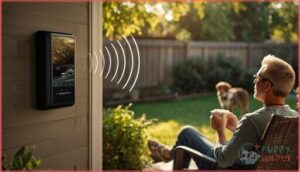This site is supported by our readers. We may earn a commission, at no cost to you, if you purchase through links.
The constant barking started at 6 AM again. You’re exhausted, your focus at work is shot, and you’re dreading another sleepless night. Your neighbor’s dog isn’t a bad animal—but the relentless noise has turned your home into a stress zone.
Most people assume they’re stuck choosing between suffering in silence or starting a war with the person next door. The reality is different. You can stop dog barking neighbors create without destroying relationships or involving lawyers.
The solution requires understanding why dogs bark excessively, documenting what’s happening, and approaching the situation with a clear strategy that protects both your wellbeing and your neighbor’s dignity.
Table Of Contents
- Key Takeaways
- Why Neighbor Dogs Bark Excessively
- Documenting and Assessing The Barking Problem
- Approaching Your Neighbor Respectfully
- Practical Strategies to Reduce Dog Barking
- Using Tools and Barriers to Minimize Noise
- Legal Steps for Persistent Barking Issues
- When to Seek Professional Help
- Frequently Asked Questions (FAQs)
- What should I do if my dog barks at my Neighbor?
- What if my Neighbor’s dog won’t stop barking?
- How can I get a dog to stop barking?
- How do you stop a dog from Barking next door?
- What is the best way to stop a neighbor’s dog from barking?
- What can I do if my neighbour’s dog constantly barking?
- Will a dog whistle stop my neighbor’s dog from barking?
- Are dog silencers legal?
- What are some effective ways to communicate with neighbors about their barking dog?
- Can landlords evict tenants for excessive dog barking?
- Conclusion
Key Takeaways
- Excessive barking stems from identifiable causes—territorial instincts, boredom, separation anxiety, environmental triggers, or underlying health issues—and addressing the root cause is more effective than reacting to the noise itself.
- Document barking patterns with dates, times, and durations for 7-14 days before approaching your neighbor, then initiate a calm, face-to-face conversation that frames the issue as a shared problem requiring collaborative solutions rather than blame.
- Practical interventions like increased exercise (two 30-minute walks daily), mental enrichment through puzzle toys, positive reinforcement training, and physical barriers (privacy fences, white noise machines) can reduce barking by 20-70% when applied consistently.
- If direct communication fails, escalate through formal channels—file documented complaints with animal control, request community mediation services, or consult certified trainers and veterinary behaviorists—while understanding local noise ordinances that define legal thresholds and enforcement processes.
Why Neighbor Dogs Bark Excessively
Before you can solve a barking problem, you need to understand what’s driving it. Dogs don’t bark nonstop just to annoy you—they’re reacting to something in their environment or expressing an unmet need.
Here are the most common reasons your neighbor’s dog won’t stop barking.
Territorial Behavior and Protective Instincts
Dogs defend what they see as theirs—your neighbor’s yard, front door, even the fence line. That’s territorial behavior at work. When strangers walk by or another dog passes, protective instincts kick in and your neighbor’s dog launches into alert barking.
Resource guarding (toys, food, favorite spots) can ramp up the noise, especially if the dog feels its territory is under threat. Understanding the importance of methodological rigor can help in addressing similar issues in a structured manner.
Boredom and Lack of Stimulation
A dog stuck in the yard all day with nothing to do will bark—often, loudly, and for what feels like hours. Without mental stimulation or canine enrichment, boredom becomes the main barking trigger.
Studies show puzzle toys and rotating enrichment items can cut repetitive vocalizations by 20–40 percent. Regular dog exercise paired with problem-solving tasks gives your neighbor’s dog an outlet, reducing stress and those endless bark sessions.
Separation Anxiety and Loneliness
When left alone for long stretches, some dogs spiral into separation anxiety—a behavioral condition affecting 14–20 percent of dogs. You’ll hear frantic, repetitive barking that spikes right after the owner leaves.
This isn’t boredom; it’s emotional support withdrawal. Canine stress and dog loneliness drive the vocalizations, especially in dogs bonded tightly to their humans.
Separation issues require targeted dog behavior modification, not just distraction.
Environmental Triggers and Noises
Beyond anxiety lies another culprit: the world outside. Traffic, sirens, construction—everyday noise pollution triggers excessive barking when your neighbor’s dog hears unfamiliar or sudden sounds.
- Delivery trucks and lawn equipment peak during the day, sparking rapid-fire alerts
- Acoustic changes from wind or rain intensify noises and heighten responses
- Visual exposure near fences magnifies reactions to moving people or animals
- Sound barriers like privacy screens help trigger reduction and noise reduction efforts
Weather effects shift how dogs perceive their surroundings, turning routine activity into perceived threats.
Medical or Health Issues
Pain often hides behind relentless barking. Arthritis, dental disease, or organ dysfunction can turn a quiet dog into a vocal one. You’ll notice increased vocalization when movement causes discomfort or during nighttime confusion from cognitive decline.
| Condition | Barking Trigger | Veterinary Care Needed |
|---|---|---|
| Arthritis pain | Movement or touch | Pain management assessment |
| Dermatitis/allergies | Chronic itchiness | Medical diagnosis, treatment |
| Ear infections | Startle from sounds | Health checks, medication |
| Vision loss | Routine activity | Canine wellness exam |
A vet consultation aids dog anxiety and promotes animal welfare through proper canine behavior analysis.
Documenting and Assessing The Barking Problem
Before you knock on your neighbor’s door, you need a clear record of what’s happening. Tracking when and how often the dog barks gives you something concrete to discuss instead of vague complaints.
Here’s how to document the problem and understand its real impact on your life.
Tracking Barking Patterns and Times
You can’t tackle what you don’t measure. Start a barking log—track start times, duration, and what triggered each episode. Use your phone or a simple notebook to document the barking over 7-14 days. Note whether noise patterns cluster during morning routines, mail delivery, or evening walks.
This tracking helps you spot barking cycles and build a solid record for any future noise complaint. Plus, it shows your neighbor you’re serious about finding solutions to stop barking for good.
Noting The Impact on Daily Life
Sleep disturbances rank first when dealing with noisy pets—chronic barking cuts into deep sleep and leaves you foggy all day.
You’ll notice daily stress climbing as unpredictable noise pollution wrecks your ability to concentrate on work or family time. Neighbors experiencing this often feel social isolation, avoiding backyard gatherings or walking routes to dodge neighborhood conflicts.
Document these real costs in your barking log before filing a noise complaint, because your lost leisure time and wellbeing matter as much as anyone’s.
Approaching Your Neighbor Respectfully
Talking to your neighbor face to face is the most effective first step toward resolving a barking problem. The conversation doesn’t have to feel awkward or confrontational if you approach it with respect and a problem-solving mindset.
Here’s how to start that conversation and work toward a solution that benefits everyone.
Initiating a Friendly Conversation
Starting off on the right foot makes all the difference when you’re dealing with noisy pets. Knock on the door with a smile, assume they’re not aware the barking is a problem, and you’ll be amazed how quickly neighbor disputes dissolve when you speak to your neighbor with respect.
- Greet warmly and keep your tone light—this isn’t an interrogation
- Frame it as teamwork: “I’d love to find a solution together”
- Pick a relaxed moment, not when they’re rushing out the door
- Thank them upfront for taking the time to listen
This friendly approach and calm dialogue set the stage for effective communication with neighbors, turning potential neighborhood conflicts into opportunities for conflict resolution through respectful communication and neighbor etiquette.
Explaining The Barking Issue Calmly
Once you’ve broken the ice, stick to the facts—no accusations, no drama. Share when the dog barking happens most, how it disrupts your sleep or work, and what you’ve noticed. This calm approach builds neighbor empathy and frames the issue without blame, setting up barking solutions both of you can live with.
| What to Say | Why It Works | Example |
|---|---|---|
| “Your dog barks between 7–9 AM weekdays” | Specific times show you document the barking without exaggerating | “I’ve noticed the neighbor’s dog starts around 7 when you leave” |
| “It’s hard to focus on calls” | Measurable impact keeps it factual | “My work meetings get interrupted” |
| “Can we brainstorm ways to stop barking?” | Collaborative framing invites conflict resolution | “Maybe more toys or a midday check-in?” |
| “I know schedules are tight” | Acknowledges constraints, builds trust | “I’m happy to help if that’s useful” |
| “Let’s touch base in two weeks” | Timeline creates accountability | “We can adjust if needed” |
When you speak to your neighbor with calm, observable details, you turn frustration into productive dialogue and pave the way for real change.
Expressing The Effects on Your Wellbeing
When chronic barking robs you of sleep, it’s not dramatic to say your mental health takes a hit—sleep deprivation fuels anxiety levels, emotional distress, and even social isolation.
Chronic barking doesn’t just disturb sleep—it fuels anxiety, emotional distress, and deepens social isolation
Share these real impacts with your neighbor: “The noise pollution keeps me awake, and I’m exhausted during the day.” Naming how pet noise affects your wellbeing makes the problem tangible and invites genuine noise reduction.
Suggesting Solutions and Collaboration
Once you’ve explained how the barking affects you, shift into Collaborative Approach mode—position yourself and the dog owner as teammates tackling Shared Goals. Propose a Mutual Aid plan that benefits everyone:
- Coordinate acceptable quiet hours and shared expectations.
- Trial enrichment and training interventions with clear timelines.
- Draft a written agreement outlining responsibilities and communication methods.
- Keep a shared log documenting barking incidents and responses.
- Involve Mediation Services or a certified trainer with measurable milestones.
This conflict resolution strategy strengthens community relations and helps stop barking through Community Engagement, not confrontation.
Staying Open to The Neighbor’s Perspective
Your neighbor may be juggling work, health issues, or financial limits that make training harder. Empathic Listening and Neighbor Empathy turn neighborhood conflict resolution into Mutual Understanding—ask what they’ve already tried and what obstacles they’re facing.
Open Communication about pet owner responsibilities builds trust. When you validate their challenges, you reveal better Conflict Resolution strategies and strengthen community relations around the neighbor’s dog issue.
Practical Strategies to Reduce Dog Barking
Once you’ve talked with your neighbor, you can help them tackle the barking problem head-on. The right mix of exercise, mental stimulation, and training can make a dramatic difference in a dog’s behavior.
Here are four practical strategies that address the root causes of excessive barking.
Offering Enrichment Toys and Activities
Boredom fuels frustration, and frustration fuels noise. You can suggest your neighbor rotate sensory toys, puzzle feeders, and interactive games to keep the dog mentally engaged. Calming aids like treat-dispensing toys work wonders for anxious pups.
A solid enrichment plan tackles dog behavior at its root, benefiting both the dog owner and everyone within earshot. It’s practical pet care that respects animal behavior and your sanity.
Increasing Walks and Exercise
Physical stimulation calms reactive dogs faster than any gadget. You might suggest your neighbor commit to two 30-minute daily walk plans—that’s the baseline for medium and large breeds. High-energy pups need closer to 60 minutes split across sessions.
Consistent exercise routines improve dog fitness, reduce territorial barking, and support both animal welfare and control. A tired dog is a quiet dog.
Suggesting Training and Socialization
Structured training gives dogs the impulse control they lack. Recommend your neighbor explore these evidence-based approaches:
- Positive Reinforcement and Clicker Training – Reward quiet behavior instantly; dogs learn commands faster when good choices earn treats.
- Socialization Techniques – Group classes reduce fear-based barking by 40% through controlled exposure.
- Behavior Modification exercises – “Quiet” cues paired with rewards create lasting obedience training results.
Puppies socialized before six months show dramatically lower barking rates long-term. Understanding dog training methods is essential for addressing excessive barking.
Creating a Calm Environment for The Dog
Consistency anchors canine behavior modification better than any single trick. Dogs thrive when their day follows a predictable pattern—routine reduces stress that fuels excessive barking.
| Strategy | Implementation |
|---|---|
| Dog Routine | Set fixed meal, walk, play, and rest times daily |
| Quiet Areas | Designate calm spaces away from noise triggers |
| Sensory Management | Use white noise or music during rest periods |
| Canine Comfort | Provide fresh water, proper temperature, good bedding |
| Mental Engagement | Rotate puzzle toys to prevent boredom |
Structure creates calm spaces where dog obedience training actually sticks.
Using Tools and Barriers to Minimize Noise
Sometimes conversation and training aren’t enough—you need physical solutions that address the barking at its source. Tools and barriers can block visual triggers, reduce noise transmission, or interrupt the barking cycle before it escalates.
Here’s what actually works when you need to take a more hands-on approach.
Installing Fences or Privacy Screens
A solid fence or privacy screen can be the dividing line between peace and chaos. By blocking visual access to your yard, you eliminate the stimuli that set off your neighbor’s dog. Here’s how to do it right:
- Choose fence height between 4 and 6 feet to prevent jumping and create secure yard enclosures
- Select solid panels or tightly slatted barrier materials that block line-of-sight triggers completely
- Use weather-resistant materials compliant with local building codes for long-term noise reduction
- Guarantee stable installation with proper wind load support and secure fastenings
- Verify HOA rules before starting fence installation to avoid costly mistakes
This approach addresses noise pollution and disturbance at the source, giving the dog owner’s pet fewer reasons to bark while protecting your sanctuary.
Employing White Noise or Calming Music
Think of sound masking as a gentle veil over your neighbor’s barking dog. White noise machines or calming tunes create audio therapy that reduces noise pollution and disturbance in your space.
Set up a device near windows facing the problem, and you’ll notice how music therapy for noise reduction can transform your home from battlefield to sanctuary. It’s simple dog behavior modification through smart soundscaping.
Utilizing Bark Control Devices (e.g., Sunbeam Ultrasonic)
Ultrasonic dog repellers and bark control devices like Dog Silencer MAX send sound waves uncomfortable to dogs but inaudible to you. While the manufacturer claims a 90% success rate up to 300 feet, real-world device effectiveness varies by breed and temperament.
Pair ultrasonic technology with training methods for best results—consistency matters more than the gadget itself. Test placement carefully and watch for stress signals in the dog.
Placing Visual Barriers to Limit Triggers
When neighbors’ dogs can’t see what’s setting them off, barking often drops dramatically. Privacy screens or lattice fencing create visual obstruction that blocks outdoor triggers—passersby, other animals, even moving cars.
Effective barrier materials and fence installation include:
- Vinyl or powder-coated panels that withstand weather and dog wear
- Placement near windows where the dog owner notices most territorial barking
- Height matching the dog’s jumping ability for true trigger reduction
- Pairing with dog training and enrichment for lasting noise minimization
Blocking sight lines gives barking dogs fewer reasons to sound the alarm.
Legal Steps for Persistent Barking Issues
Sometimes a friendly conversation won’t solve the problem, and you need to take things to the next level. Before you feel stuck or overwhelmed, know that you have legal options designed to protect your peace at home.
Let’s walk through the formal steps you can take when barking becomes a persistent issue.
Understanding Local Noise Ordinances
Your city’s noise regulation likely caps permissible barking hours and decibel thresholds—community standards that animal control enforces through ordinance enforcement. Check municipal policies online or call your local office to learn specific legal remedies for community noise issues.
Most local animal laws and regulations define violation triggers, complaint processes, and penalties that address noise pollution reduction. Knowing these rules strengthens your position in neighborhood disputes and guides next steps.
Documenting Repeated Incidents
Once you know the rules, start incident logging—your record of every barking episode builds a clear case. Note the date, time, and duration each time your neighbor’s dog disrupts your day.
Track barking patterns by recording triggers like passing cars or other dogs. This noise monitoring creates data visualization that turns community noise issues into facts, not frustration.
Solid documentation is your strongest tool when dealing with noisy dogs and neighborhood disputes.
Filing Complaints With Animal Control
When direct talks fail, file a complaint with animal control. Submit a written or online form detailing your logged incidents—dates, times, recordings.
Officers will investigate whether the neighbor’s dog violates local noise ordinance and barking laws. Most agencies issue warnings first, then pursue enforcement actions like fines if the dog barking continues.
This complaint process aids conflict resolution strategies while protecting animal welfare and care.
Mediation Services for Neighbor Disputes
If animal control warnings don’t resolve the issue, request mediation through your city’s community dispute settlement program. A neutral facilitator guides you and your neighbor toward a written agreement—covering quiet hours, training timelines, and accountability steps.
These conflict resolution strategies preserve community relations and harmony while addressing the neighbor’s dog barking head-on. Mediation benefits include:
- Free or low-cost sessions funded by municipal programs
- Confidential dialogue in a private, structured setting
- Enforceable action plans with follow-up options
- Faster resolution than court proceedings
- Improved community engagement and long-term cooperation
When to Seek Professional Help
Sometimes the barking won’t stop no matter how many strategies you try on your own. That’s when bringing in an expert can make all the difference—whether it’s a trainer who specializes in behavior modification, a veterinary behaviorist who can identify deeper issues, or a vet who can rule out medical problems.
Here’s when to call in professional help.
Consulting a Certified Dog Trainer
When barking won’t quit, a certified dog trainer brings professional guidance that changes everything. Look for credentials from the CCPDT or IAABC—these prove mastery in dog behavior and training methods through rigorous certification processes.
A qualified trainer assesses your neighbor’s dog, then designs obedience training that targets the root cause. Most offer an initial consultation to map out dog training techniques that actually stick.
Working With a Veterinary Behaviorist
Sometimes behavioral assessment reveals what training alone can’t fix. A veterinary behaviorist—a specialist with a veterinary degree and board certification in canine behavior—diagnoses the root causes of excessive barking through thorough dog psychology evaluation.
They integrate medical interventions, animal behavior modification protocols, and veterinary guidance customized to your neighbor’s dog. Their training methods combine dog behavior and training expertise with clinical precision, addressing issues from anxiety to territorial aggression that standard dog training and behavior approaches miss.
Addressing Potential Health Problems With a Vet
Pain can fuel constant barking when you least expect it. A vet consultation includes health screening to catch arthritis, dental disease, or thyroid issues your neighbor’s dog owner might miss.
Medical diagnosis through pain assessment reveals hidden triggers behind excessive dog behavior. Treatment planning combines medication and animal behavior modification so the dog barking finally stops—and your peace returns.
Frequently Asked Questions (FAQs)
What should I do if my dog barks at my Neighbor?
If your dog barks at neighbors, start with impulse control training using positive reinforcement. Increase daily exercise and mental enrichment.
Work with a certified trainer on counterconditioning strategies to reduce reactive behavior effectively.
What if my Neighbor’s dog won’t stop barking?
Living next to a canine alarm clock that never snoozes? Document the barking patterns, approach your neighbor calmly about dog behavior solutions, and explore conflict resolution strategies before escalating to noise pollution complaints under local barking laws.
How can I get a dog to stop barking?
You can’t directly control a neighbor’s dog, but positive reinforcement training—teaching “quiet” commands with treats—reduces barking by 70% when your neighbor applies it consistently over four to six weeks.
How do you stop a dog from Barking next door?
Start with a friendly conversation to address the issue collaboratively. Document barking patterns, suggest training and enrichment, and use barriers like fences or white noise to manage noise while respecting your neighbor’s perspective.
What is the best way to stop a neighbor’s dog from barking?
Calm, clear conversations create cooperation. Approach your neighbor gently, explain how the barking affects you, and collaborate on practical solutions—enrichment toys, walks, and barriers—that benefit everyone involved.
What can I do if my neighbour’s dog constantly barking?
Document every barking episode with dates and times, then approach your neighbor calmly to discuss dog behavior solutions.
If diplomacy fails, consider community mediation or local noise ordinances for persistent issues.
Will a dog whistle stop my neighbor’s dog from barking?
A dog whistle might interrupt barking briefly, but it won’t solve the root cause. Think of it like hitting snooze—temporary relief, not a real fix.
Training and addressing triggers deliver lasting results.
Are dog silencers legal?
Yes, dog silencers and sonic devices are generally legal in the United States, though device regulations vary by city and county under noise ordinances and animal welfare laws.
Check local animal control rules before using any antibarking device.
What are some effective ways to communicate with neighbors about their barking dog?
Start the conversation face-to-face when you’re both calm. Use “I” statements to describe how the barking affects your sleep or work, then propose solutions together. Respectful approach and effective listening build neighbor empathy and conflict resolution.
Can landlords evict tenants for excessive dog barking?
Like a town crier demanding quiet, landlords can pursue Lease Termination if excessive barking violates noise ordinances or lease clauses—but the Eviction Process requires documented complaints and proper legal notices before removing tenants.
Conclusion
Isn’t peace at home worth fighting for, even when the battle is just against noise? You don’t have to choose between resentment and confrontation.
When you stop dog barking neighbors with calm steps and practical solutions, you reclaim control over your space. Respect, patience, and clear communication turn frustration into progress.
The quiet you seek isn’t impossible—it’s earned by taking action, not just enduring. Let your next morning start with calm, not chaos, and know you made it happen.
- https://www.aspca.org/investigations-rescue/recognizing-and-reporting-animal-cruelty-and-neglect
- https://www.youtube.com/watch?v=DBmLFn6YyoM
- https://pmc.ncbi.nlm.nih.gov/articles/PMC6067676/
- https://www.companionvet.ca/wp-content/uploads/2021/06/Importance-of-pre-adolescent-training.pdf
- https://www.wagbar.com/puppy-socialization-timeline-critical-windows-milestones-3-16-weeks
















